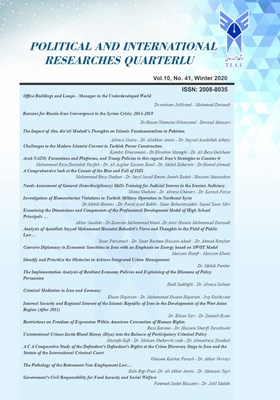Challenges to the Modern Islamist Current in Turkish Power Construction
Subject Areas : Political and International Researches Quarterly
Keywords: Turkey, Power, AKP, Secular, Islamist,
Abstract :
Kambiz Gharamani[1] Ebrahim Motaghi[2] Ali Reza Golshani[3] Abstract: The purpose of this study is to examine the challenges facing the new Islamist current in the construction of Turkish Islamist power. The new Islamists in Turkey are actors who practically undermined the Kemalist discourse in a democratic way, bringing the new discourse of Islamism to the fore. Turkey's domestic and foreign policy have faced two major challenges since the AKP came to power: domestic authoritarianism, and aggressive foreign policy. Both issues have greatly affected Turkey's domestic and international legitimacy. Domestic authoritarianism, above all, looks at Erdogan's power-seeking, reminiscent of rivals and changes in the constitution, reminiscent of Islamic and Turkish monarchies that have long dominated Turkey's past. Neo-Ottomanism is the central axis of Turkish foreign policy. Turkish leaders strive to build on their country's "pivotal" role and place a historic and grand mission in their country. On the other hand, ideological orientation does not abandon the leaders of the AKP. By arguing that Turkey is an Islamic state, they have strongly defended the regional policies of some Islamist currents, such as the Muslim Brotherhood. [1] PhD student, Political Thought, Department of Political Science, Shahreza Branch, Islamic Azad University of Shahreza, Iran [2] Professor and Faculty Member, Political Science, Department of Political Science, Faculty of Law and Political Science, University of Tehran [3] Associate Professor, Department of Political Science, Shahreza Branch, Islamic Azad University, Shahreza Branch, Iran
_||_

